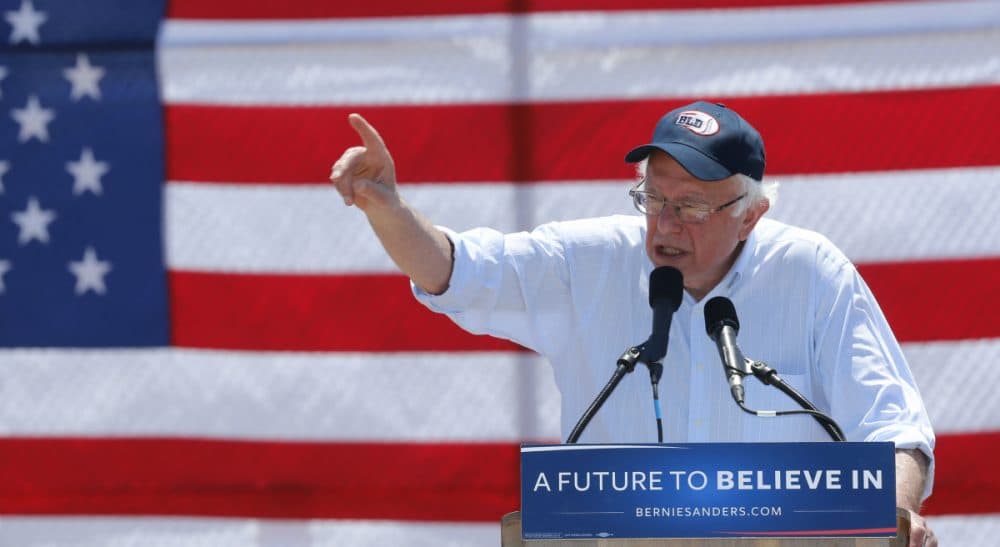Advertisement
Bernie Sanders Post-Nevada, And The Problem Of Political Hubris

The chair-throwing in Nevada revealed some difficult truths. Bernie Sanders’s campaign has created a movement: in his words, a movement for “political revolution.”
But stop for a moment: Movements are not electoral campaigns. Their members are not voters or partisans, but crusaders. They are righteous, on the side of the angels. Their opposition – the elusive “establishment” — is, then, on the wrong side of history. And that opposition is self-serving and corrupt; its institutions and processes “rigged.” The Sanders movement has all the characteristics of an excited, fledgling movement, with one deep problem: It is being carried on within the electoral efforts of the Democratic Party.
Bernie Sanders now has Hillary Clinton fighting on two fronts.
This means that Hillary Clinton, not the Republican opposition, is cast as the nefarious status quo. She is personally accused of being corrupt. She is the cause of outrage. She and other party leadership and practices are targeted for overthrow.
Social movements are whirlwinds that their leaders cannot always control. Sanders did not encourage violence in Nevada or death threats against the state party chairwoman. He has never endorsed his supporters’ online verbal assaults on women. He has — however weakly — disavowed threats of violent disruption and disobedience at the national convention. He is proud of having aroused avid supporters. He is defiant in the face of almost any criticism. In his speech in California on the eve of his win in Oregon, he claimed success for his campaign because, “we alone speak the truth.”
Sanders’s “what is progressive?” challenge to Clinton has invigorated debate about public policy. It also made good political sense when Democrats anticipated that the ideology and program of the Republican nominee would fall within the known contours of conservatism. Then, the election would have taken the now familiar path of party polarization. But whether the best characterization of Donald Trump is authoritarian or proto-Fascist, hateful or unstable, this is not the usual conservative challenge. It is rooted not in ideology or interests, but in an erratic personality and inchoate grievances. Yet, one by one, Republicans of every stripe, even Trump’s ferocious detractors, are beginning to rally around him. The general election has begun.
Bernie Sanders now has Hillary Clinton fighting on two fronts. He has decided to remain in the primary race up to the convention. But to defeat Trump, he must endorse Clinton strongly at the convention. He must convert the movement into an alliance. He and all Democrats — including the Left, hopeful reformers and passionate "anti-establishment" voters — must avoid the mistake of undermining Clinton's pragmatic liberalism or her character. Turn-out will be decisive. Holding out for political revolution as a reason not to join Clinton is hubris and historical folly in the face of Trump’s challenge to American democracy.
Holding out for political revolution as a reason not to join Clinton is hubris and historical folly in the face of Trump’s challenge to American democracy.
This is Sanders’s test. It is a tough test for someone who, throughout a long political career, has not identified as a Democrat or exhibited attachment to the party and its leadership. Yet the first and crucial goal must be to defeat an unqualified, deeply undemocratic Republican candidate.
Sanders should also understand that, as matter of history, every movement needs an organized party to realize its goals. Consider Martin Luther King, Jr., or Lyndon Johnson and his Civil Rights agenda. The Democratic Party, whatever its entrenchments, is the home of progressivism.
Sanders is facing a test of character. He can continue to try to ride the whirlwind, or he can come down to earth and take on the messy business of compromise. Clinton faces a challenge of her own in recognizing his contributions and granting him and his followers prominence at the convention. But avoiding a national Nevada is Sanders’s test now.
 This op-ed was co-authored by Jane Mansbridge, the Adams professor of Political Leadership and Democratic Values at Harvard's Kennedy School of Government and a member of the Scholars Strategy Network.
This op-ed was co-authored by Jane Mansbridge, the Adams professor of Political Leadership and Democratic Values at Harvard's Kennedy School of Government and a member of the Scholars Strategy Network.